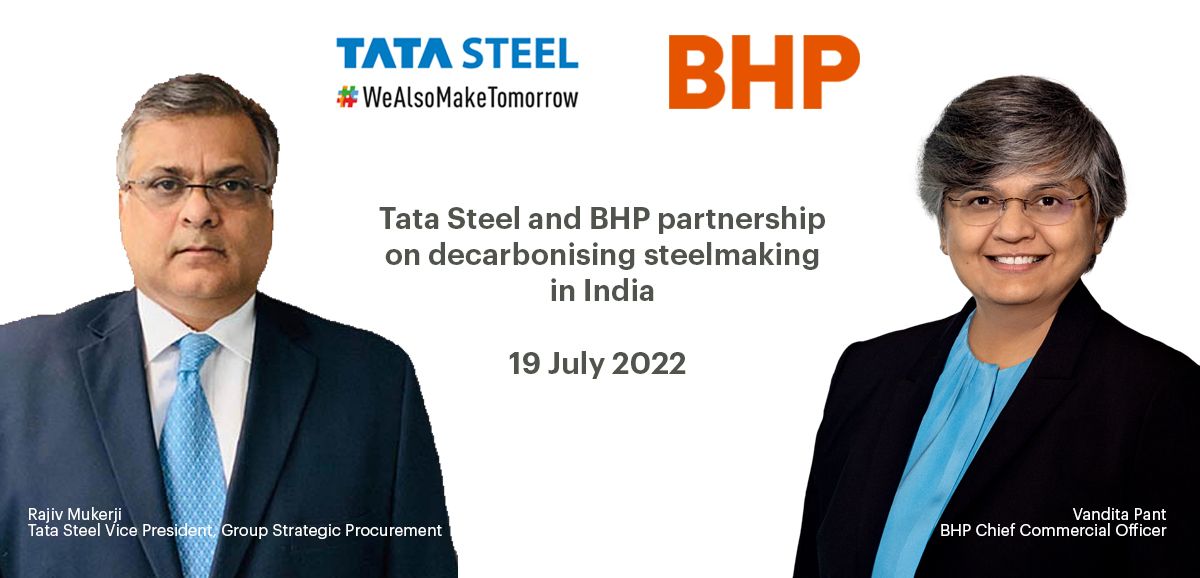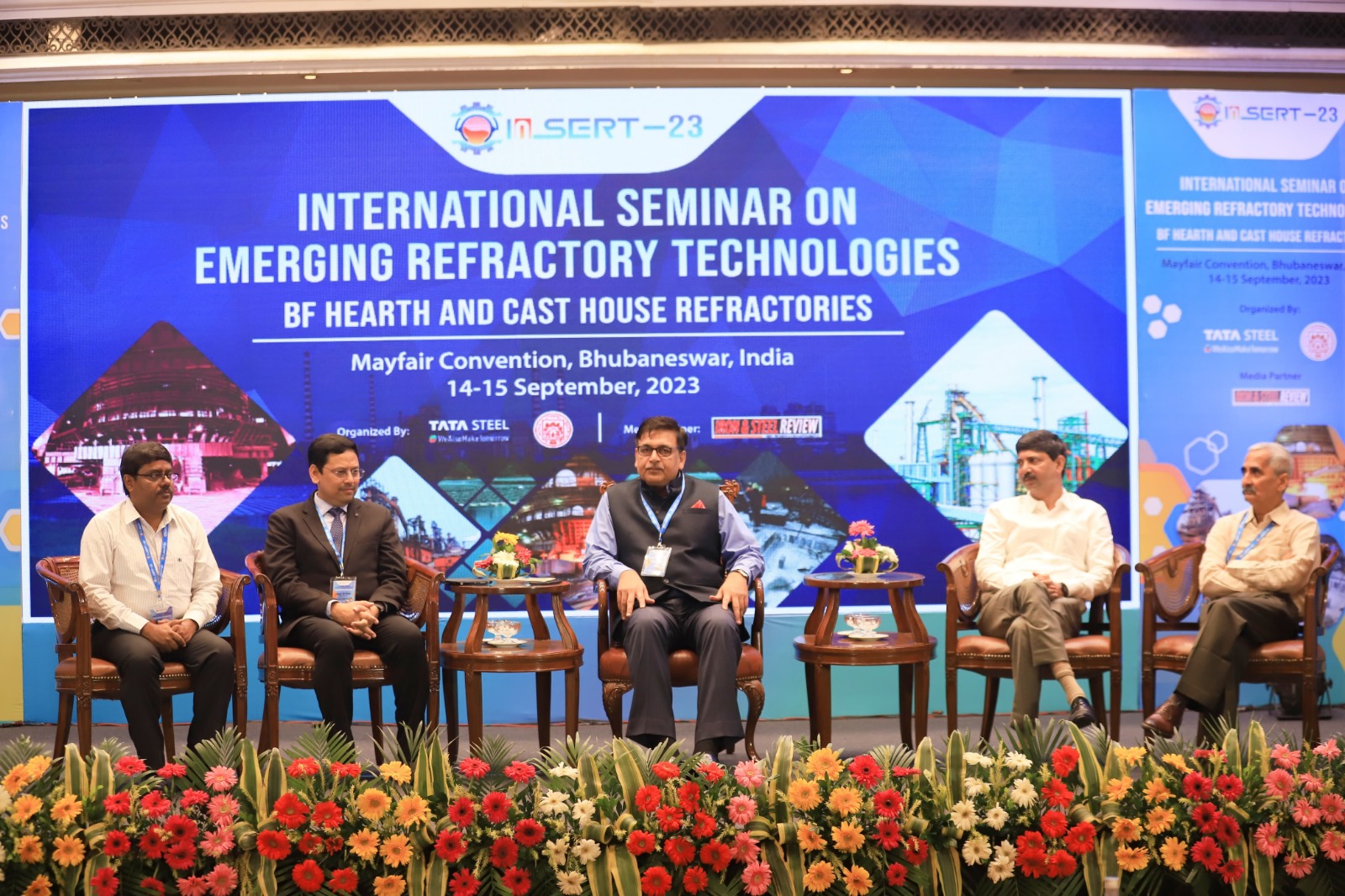Mumbai: Tata Steel has signed a Memorandum of Understanding (MoU) with BHP, a leading global resources company, with the intention to jointly study and explore low carbon iron and steelmaking technology.
Under the partnership, Tata Steel and BHP intend to collaborate on ways to reduce the emission intensity of the blast furnace steel route, via two priority areas – the use of biomass as a source of energy and the application of carbon capture and utilisation (CCU) in steel production. The partnership aims to help both companies progress toward their climate change goals, and support India’s ambitions to be carbon neutral by 2070.
The technologies explored in this partnership can potentially reduce the emission intensity of integrated steel mills by up to 30 per cent. More importantly, these projects demonstrate how abatements applied to the blast furnace iron-making process, which contributes to more than 60 per cent of India’s steel production, can materially reduce the carbon intensity of the existing capacity.
Beyond these projects, Tata Steel and BHP have committed to a robust ongoing knowledge exchange that will see both parties explore further collaborations, ecosystems, and business opportunities in the steel value chain and the research and innovation sectors in India and Australia.
On the partnership, Rajiv Mukerji, Vice President, Group Strategic Procurement, Tata Steel, said: “The steel sector will play a critical role in achieving India’s net-zero commitment. Tata Steel is already working on several pilot projects focused on developing deep decarbonisation technologies such as CCU, hydrogen-based steelmaking, use of biomass and other alternate ironmaking routes. We believe strategic collaborations are vital in paving the way for innovations to accelerate the deployment of breakthrough technologies at scale and therefore this partnership with BHP is an important step for us.”
Adding further, Dr. Debashish Bhattacharjee, Vice President, Technology & New Materials Business, Tata Steel, said: Tata Steel strives to be a technology and an innovation leader in the steel industry. By leveraging in-house capabilities and collaborating with research and industrial organisations, Tata Steel aims to build the right ecosystem for accelerating this journey. With sustainability gaining centre stage globally, it is paramount that we take ambitious steps toward exploring sustainable options to mitigate our environmental footprint.
We look forward to collaborating with BHP on this journey towards becoming a net-zero company.
BHP’s Chief Commercial Officer, Vandita Pant, said that the partnership with Tata Steel highlights the importance of collaborations in being able to successfully identify and implement emission reduction technologies in steelmaking, notably by using abatements that can be applied to the existing blast furnace process to incrementally reduce its carbon emissions intensity. She also highlighted how BHP can contribute to Tata Steel’s, and the broader steel industry’s role in helping to achieve India’s ambitions to be carbon neutral, particularly as India is expected to see robust steel demand growth over the next three decades, underpinned by a growing population and rising urbanisation.
“India has invested heavily in the blast furnace route for steel production, and crude steel output was 118MnT last year. It is, therefore, critical to innovate and demonstrate pathways to reduce emissions from the blast furnace steel production route, while alternative steel pathways emerge and low carbon energy systems scale-up.
A greener steel industry will be integral for India’s growth and decarbonisation journey, and we intend to work hard with Tata Steel to enable this development and hopefully set a benchmark for others in the industry to emulate and learn from. Finding pathways to net zero for steelmaking is challenging and complex but we believe that by working with industry leaders like Tata Steel, together, we will find solutions more quickly to help reduce carbon emissions in steel production,” she added.
Tata Steel and BHP have been heavily involved in establishing partnerships with like-minded industry leaders in reducing emissions in steelmaking. Tata Steel has been actively engaging with technology companies, academia, and companies from other sectors having similar challenges on decarbonisation.
Tata Steel has signed an agreement with Shell India Markets Private Limited to evaluate and co-develop short- and long-term options for improvement in energy efficiency, optimisation of demand around carbon-intensive products and services and others. Additionally, Tata Steel and the Council of Scientific & Industrial Research (CSIR) have signed an MoU to collaborate on CCUS, opening the doors for joint development of advanced technologies with 38 CSIR labs across the country. Tata Steel also signed an MoU with the Indo-German Science and Technology Centre (IGSTC) and the Indian Navy to promote a culture of innovation in the country. Multiple start-ups have been onboarded, and 31 fully funded trials were conducted across the steel value chain in collaboration.
BHP has in recent years partnered with global majors POSCO, China Baowu, JFE Steel and HBIS Group to explore greenhouse gas emissions reduction from steelmaking. The combined output of the five steel companies equates to around 13 per cent of reported global steel production.


















